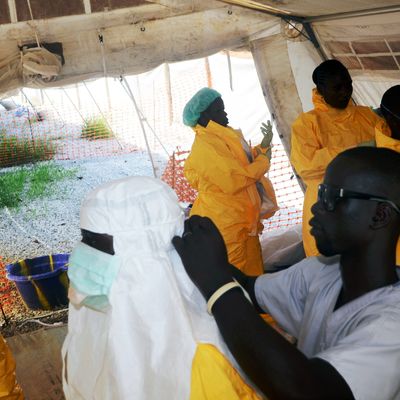
The most notable thing about the Ebola outbreak that has moved across West Africa this summer is how cool and rational the response has been. We have been watching the most extensive outbreak ever recorded of the most terrifying communicable disease we know, one that has spread from the bush to a city of 20 million and to another continent. There are graphic and terrifying reports from the Ebola wards. And yet, with the single, notable exception of Donald Trump, who, at moments like this, seems less like an actual human being than some alien construction sent here to troll us, this has been a pandemic without panic.
Isolation procedures have been carefully explained and, where resources permit, followed. Western victims have been repatriated to receive better treatment without much fuss. Experimental drugs have been speedily converted into therapies, but with a good amount of caution and without overpromising. Prudent countermeasures have been taken: Screening has been implemented at airports in affected areas; a regional sports tournament has been postponed. But imprudent ones have been avoided. Western borders have not been sealed, travel has been mostly unimpeded, governments have not covered up what they know, and there has been no rush to blame or condemnation. We have explained to one another that flu, another disease whose origins and cause we don’t really know, will kill 100 times as many people this year as Ebola has. The moment when the contagion hit Lagos is akin to the moment in the virus movies — or in the real-life history of HIV — when the world succumbs to a collective freakout. And yet, even in Nigeria, a basic transparency and decency has prevailed. Given Iraq and Gaza, it has been a grim summer, generally, for human beings, but in the case of Ebola, society has kept its head.
Still, there has been something a little bit unsettling and surreal about the condition that has allowed that sanity, the creation of the first mass-quarantine area, or cordon sanitaire, since the end of World War I. In Sierra Leone, as Adam Nossiter wrote in Tuesday’s Times, “a region the size of Jamaica has been cut off from the rest of the country because [of] roadblocks.” The military has been dispatched to enforce a similar quarantine in areas of Liberia, and in both countries, alarms have been raised about mass starvation, with people unable to exit the quarantine zone and supplies unable to enter.
It has been apparent for a little while that doctors in rural, undersupplied quarantine wards were struggling even to keep themselves safe. Sierra Leone’s lead Ebola doctor himself succumbed to the disease. More arresting still was a dispatch sent in by the great science writer Richard Preston, from Kenema, Sierra Leone.
Preston follows two American doctors into a rural Ebola ward — “a makeshift structure with walls made of plastic film,” its floor “splashed with blood, urine and feces” — in which the hemorrhagic fever and convulsions often throw Ebola patients out of their beds, and whole teams of exhausted nurses working 12-hour shifts are required to put the patient back in the bed and to decontaminate the area. (This is essential, because Ebola is spread through contact with blood.) These doctors and nurses wear biohazard suits throughout Preston’s telling. And yet, by the end of his brief story, many of these careful, space-suited attendants — the chief doctor, the chief nurse — are themselves dead.
Isolation is an effective social response to Ebola, and to the unaffected, a soothing one. It conveys order. But within the locked boxes of West African Ebola wards, the reports are of a primeval chaos at every level, from the cellular, where the virus breaks down the barriers that keep one cell from leaking into the next, to the institutional, where even some doctors and nurses wearing biohazard suits can die. The Times’ Nossiter overheard a Western medical technician in Kenema calling out to co-workers, “Don’t touch the walls! Totally infected.”
The hospitals within those zones are badly undersupplied: The Times cited a Kenema doctor’s email to American medical school classmates saying he needed items as basic as gloves, goggles, and disinfectants. Those resource problems have made the disease more difficult to contain.
The alarm raised during the past week is that perhaps this chaos is spreading beyond the wards, throughout the quarantine zones. “People don’t die here now — they are dying in the community, five, six a day,” a burial technician at Kenema’s hospital told the Times last Thursday. It is possible that the contagion will spread past the roadblocks: Reporters have noticed that some checkpoints are in fact lightly policed, or not policed at all. Several African countries have banned all travel from Ebola-stricken countries; others have simply banned certain airlines until they can meet screening criteria. Probably these measures will work: To judge by the tone of the experts (concerned, but not panicked), it is still likely that we will be able to keep the disease from spreading out into the world, from moving far beyond the quarantine zones.
But there is still the chilling fact that those zones exist at all. It has been great to see — given the memory of the HIV crisis — how well public-health information has been communicated to the public, how little politics have interfered with medical science, how transparent and free from social stigma the response has been. But it is bracing to be reminded of what the fallback solution is when medicine cannot contain a disease that is spreading from person to person: It is still the brutal practice of quarantine, to seal off the sick in order to spare the well.





























